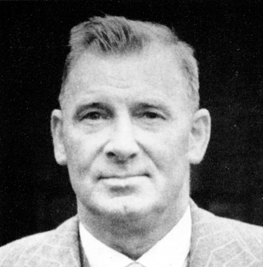- Home /
- History /
- Past Managers /
- George Kay

Date of Birth
21 Sep 1891
Birthplace
Manchester
Nationality
English
Games
354
Games Won
140
Games Drawn
93
Games Lost
121
Staff Honours
First Division champions 1947
Profile
Despite leading Liverpool to a First Division title and an FA Cup final, few would argue that the most memorable feat of George Kay's spell in charge of Liverpool was the signing of one Billy Liddell.
The Scot is widely regarded as one of the finest players in the club's illustrious history and proved to be a key figure during Kay's tenure, as would the additions of Bob Paisley and the legendary Albert Stubbins.
Kay arrived at Anfield in 1936 after five years at Southampton. The outbreak of World War II did little to help his vision for the club, but once it was over, he brilliantly planned his assault on the first post-war championship by taking the team on a trip to the USA and Canada.
The tour gave the Reds time to gel and, after benefitting from a lack of food rationing, the team returned to England fit and ready to stand the strain of a season that only ended in July after a harsh winter created a fixture pile-up.
Liverpool, Manchester United, Wolverhampton Wanderers and Stoke City were all in with a chance of taking the title as the season reached its climax. The Reds' final fixture was against Wolves at Molineux. The hosts had 56 points, the visitors 55.
Liverpool had to win … and then wait and hope. They did their part of the job by securing a 2-1 victory. Other results then went their way and the Reds were champions of the Football League for a fifth time. It was Kay’s finest moment as a football manager - but it wasn't the only success that season.
The title triumph of 1947 would form part of a unique 'quadruple', with the memorable victory over Everton in the Liverpool Senior Cup, supplemented by an additional two local cups.
Star performers Jack Balmer and Albert Stubbins would prove to be prolific scorers in Kay’s post-war spell as Liverpool manager but the club couldn't land another championship.
The nearest they came to further success was in 1950 when they reached the FA Cup final for only the second time in our history. Sadly, the big day out at Wembley ended in disappointment with defeat to Arsenal.
George travelled to London and led the team out but he was far from being a well man. It was clear that he could not continue for much longer as manager of the club. He retired in January 1951 a few months short of his 60th birthday.
He bravely battled against illness with strength and courage but died in Liverpool three years later on April 18, 1954.
Much of his managerial career at Anfield was interrupted by the war and many feel he may have achieved even more if it were not for this debilitating intrusion.
His death prompted Billy Liddell to say: "If ever a man gave his life for a club, George Kay did so for Liverpool."






















